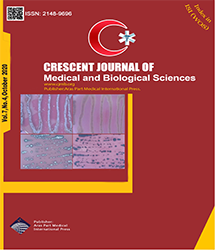
| Review | |
| Management of Hemorrhoid Complications in Persian Medicine | |
| Khadijeh Hatami1, Amir-Hooman Kazemi-Motlagh1, Hossein Ajdarkosh2, Arman Zargaran1, Mehrdad Karimi1, Ali-Asghar Haeri Mehrizi3, Hoorieh Mohammadi Kenari4 | |
| 11Department of Traditional Medicine, School of Persian Medicine, Tehran University of Medical Sciences, Tehran, Iran 2Gastrointestinal and Liver Disease Research Center, Iran University of Medical Sciences, Tehran, Iran 3Health Metrics Research Center, Iranian Institute for Health Sciences Research, Academic Center for Education, Culture, and Research, Tehran, Iran 4Department of Traditional Medicine, School of Persian Medicine, Iran University of Medical Sciences, Tehran, Iran |
|
|
CJMB 2020; 7: 457-466 Viewed : 4730 times Downloaded : 4504 times. Keywords : Hemorrhoid, Persian Medicine, Phlebotomy, Leech |
|
| Full Text(PDF) | Related Articles | |
| Abstract | |
Objectives: Hemorrhoid disease has been a common medical problem since ancient times. About 5%-10% of patients do not respond to conservative treatment, and surgical procedures have a 20%-25% complication rate including pain, stenosis, infection, incontinence, and the like. Thus, most patients and physicians seek alternative and complementary medicines. Persian medicine (PM) is one of the oldest traditional medicines that present different treatment methods for managing hemorrhoid complications. Accordingly, the present study reviewed these methods and their applications. Methods: This historical review surveyed the principle of management and different medicinal and non-medicinal treatments for each complication of hemorrhoid based on the main textbooks of disease-treatment and famous pharmacopoeias of PM from 10th to 18th century AD. Recent findings about their pharmaceutical properties and mechanisms of action were searched in Google Scholar, Science Direct, and PubMed databases. Results: In PM, it is believed that hemorrhoid disease is because of melancholic or sanguineous distemperament. Cleansing the body and then strengthening the gastrointestinal and the liver for more effective treatment and prevention of relapse are the first therapeutic approaches in this regard. They use herbal and non-herbal medicines with anti-oxidant and anti-inflammatory, analgesic, and phlebotonic properties. In addition, different methods of bloodletting are used for body cleansing, reducing pain, and treating bleeding or thrombotic hemorrhoids. Conclusions: In general, the proposed herbal and non-herbal medicines could be formulated for generating different pharmaceutical products. Finally, non-pharmaceutical methods could be used for postponing the need for surgical interventions. |
Cite By, Google Scholar
Google Scholar
PubMed
Online Submission System
 CJMB ENDNOTE ® Style
CJMB ENDNOTE ® Style
 Tutorials
Tutorials
 Publication Charge
Medical and Biological Research Center
About Journal
Publication Charge
Medical and Biological Research Center
About Journal
Aras Part Medical International Press Editor-in-Chief
Arash Khaki
Deputy Editor
Zafer Akan


















